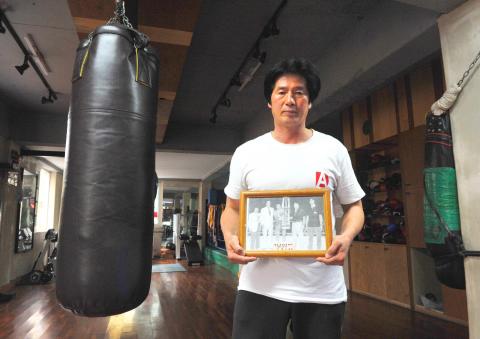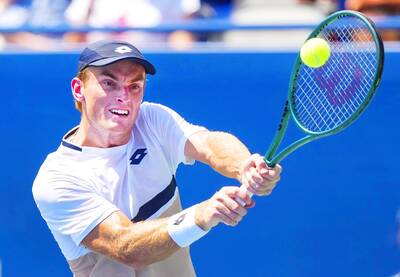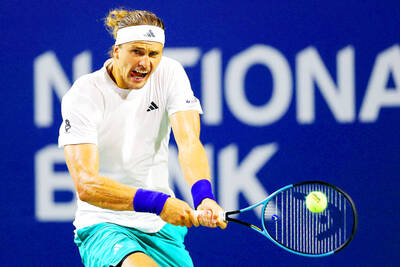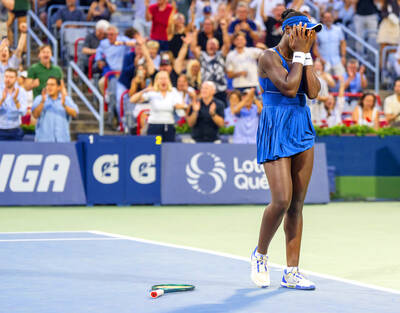Thirty years ago this month, South Korean boxer Kim Duk-koo entered a Las Vegas ring for a world championship bout that would end with his death, trigger at least one suicide and change the sport forever.
For a generation of South Koreans, millions of whom watched live on television, the fight between Kim and world lightweight champion, Ray “Boom Boom” Mancini, remains a powerful memory.
Now a new book and accompanying documentary that coincide with the 30th anniversary hope to shed fresh light on the bout, its tragic aftermath and the impact it had on the lives and families of its two protagonists.

Photo: AFP
For Kim, then 23 and fighting for the first time in the US, the glitz of Caesar’s Palace with its celebrity audience including the likes of Frank Sinatra, was a different universe from his impoverished upbringing in South Korea.
“I remember when we landed in Las Vegas for the fight,” his trainer, Kim Yoon-gu, now 56, said.
“The city was all lit up at night. It was like landing on a garden of flowers in the desert. We’d never seen anything like it,” he told reporters at the boxing gym he runs in Seoul.
US boxing commentators had pretty much written Kim Duk-koo off before the Nov. 13, 1982, clash with Mancini, a powerful 21-year-old from Youngstown, Ohio, making his second defense of the world title.
However, Kim Duk-koo was confident. Before leaving Seoul he had a carpenter rig up a mock coffin which he said he would use to bring back Mancini after the fight.
Unimpressed with such bravado, his trainer stomped it to pieces which he then hid under the ring in Kim Duk-koo’s training camp.
The fight when it came was a particularly brutal one.
For 13 rounds, the two men went toe-to-toe in a slugging match that left both with badly swollen faces and struggling to see through bruised, puffed-up eyes.
At the end of the 13th, Kim Yoon-gu tried to lift his fighter, telling him Mancini was exhausted and exhorting him to put in one last effort to finish him off.
“He clenched his teeth, nodded and said “Yes, I’ll do that.” And that was it. That was the last thing he ever said,” Kim Yoon-gu said.
At the beginning of the 14th, Mancini connected with a straight right that snapped Kim’s head back and sent him crashing to the canvas.
The Korean managed to haul himself up by the ropes to beat the count, but referee Richard Green stepped in to stop the fight.
Kim Yoon-gu had been tending to his corner and missed the actual knockout blow, but when he saw Kim Duk-koo on the ground, he knew at once that the fight was over.
“He was obviously hurt, but at that time we had no idea it was so serious,” he said.
Back in his corner, Kim Duk-koo collapsed and was taken from the ring on a stretcher to hospital where he was diagnosed with a blood clot on the brain and underwent emergency surgery. He lapsed into a coma from which he never recovered and four days later he died.
On the flight back to South Korea, a traumatized Kim Yoon-gu locked himself in the toilet and “cried and cried until we landed.”
“I thought about quitting the sport entirely. In the end, I decided to stick with it, but it was a very, very difficult time,” he said at his gym where photos and posters of Kim Duk-koo adorn the walls.
The consequences of the Kim-Mancini bout were far-reaching and tragic in their own right.
Four months after her son’s death, Kim Duk-koo’s distraught mother killed herself by drinking a bottle of pesticide.
Four months after that, referee Richard Green also took his own life, although there was no indication that his suicide was linked to the outcome of the fight for which he was never held in any way responsible.
Mancini, a devout Catholic, endured a prolonged period of depression and, although he fought again, was never the same boxer.
“In all the obvious ways, he was haunted,” US sportswriter Mark Kriegel, author of a new biography of Mancini, titled The Good Son, told reporters.
“He also got over it. The complications for Ray have more to do with the fact that the rest of the world didn’t get over it and continued using that fight as a kind of reference point for his life,” Kriegel said.
Kriegel’s book, and an accompanying documentary of the same name, climax with an emotional reunion in June last year between Mancini and Kim Duk-koo’s family.
Kim Duk-koo’s fiancee, Lee Young-mee, had been pregnant at the time of the 1982 title fight and seven months later gave birth to a son, Kim Jiwan, now 29.
While being interviewed by Kriegel for the book, Kim Jiwan had suggested a trip to the US to meet with Mancini.
“As full of duty and obligation as Ray was, he wasn’t going to turn down a request from the son of the man who, without intention, died at his hands,” Kriegel said.
At the meeting in Mancini’s home, Kim Jiwan admitted to the “hatred” he once felt for the boxer, before absolving him of any blame.
The Kim-Mancini bout proved to be a watershed in boxing, triggering a series of major changes to the sport.
Championship bouts were reduced from 15 to 12 rounds, the standing eight-count was introduced and the medical tests required of boxers before a fight were overhauled.

TAIWANESE EXITS: Fellow Australian Christopher O’Connell joined Tristan Schoolkate as a winner following his 6-1, 6-2 defeat of Tseng Hsin-chun Australian qualifier Tristan Schoolkate on Monday dispatched rising Brazilian talent Joao Fonseca 7-6 (7/5), 6-4 at the ATP Toronto Masters, ensuring a breakthrough into the world top 100. The 24-year-old from Perth moved to 98th in the ongoing live rankings as he claimed his biggest career victory by knocking out the ATP NextGen champion from November last year. Schoolkate, son of a tennis coach, won his first match over a top-50 opponent on his sixth attempt as he ousted the world No. 49 teenager from Brazil. The qualifier played a quarter-final this month in Los Cabos and won through qualifying for his

Top seeds Alexander Zverev of Germany and American Coco Gauff on Tuesday advanced to the third round of the Canadian Open after both players were pushed hard by their opponents. World No. 3 Zverev, playing in his first match since his first-round loss at Wimbledon, was far from his best, but emerged with a 7-6 (8/6), 6-4 win over Adam Walton under the lights in Toronto. Momentum shifted firmly in Zverev’s favor when he won a 52-shot rally in the first set tiebreak and he sealed the win on a double fault by the Australian in the second set. “It was a very

Canadian teenager Victoria Mboko upset top-seeded Coco Gauff 6-1, 6-4 on Saturday night to reach the National Bank Open quarter-finals. “Your support was incredible,” Mboko told the crowd in French after a chorus of “Ole, Ole, Ole” chants echoed around the venue. “I’m really happy to win today ... It’s incredible. I’m so happy to beat such a great champion.” Gauff dropped to 2-3 since winning the French Open. She followed the major victory with opening losses in Berlin and Wimbledon, then overcame double-fault problems to win two three-set matches in Montreal. Gauff had five double-faults on Saturday after having 23 in

Formula 1 champion Max Verstappen on Thursday said that he is staying with the Red Bull team next year, ending months of speculation over his future. “Some people just like to stir the pot, some people just like to create drama, but, for me, it’s always been quite clear, and also for next year,” the four-time champion said ahead of the Hungarian Grand Prix. “I’m discussing with the team already the plans — the things that we want to change for next year, so that means that I’m also staying with the team for next year,” he said. Verstappen has a contract with